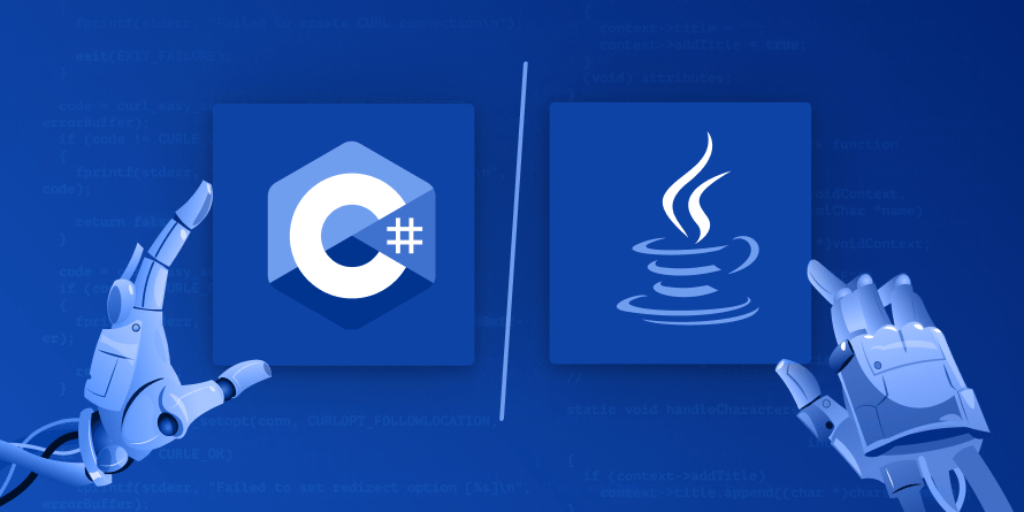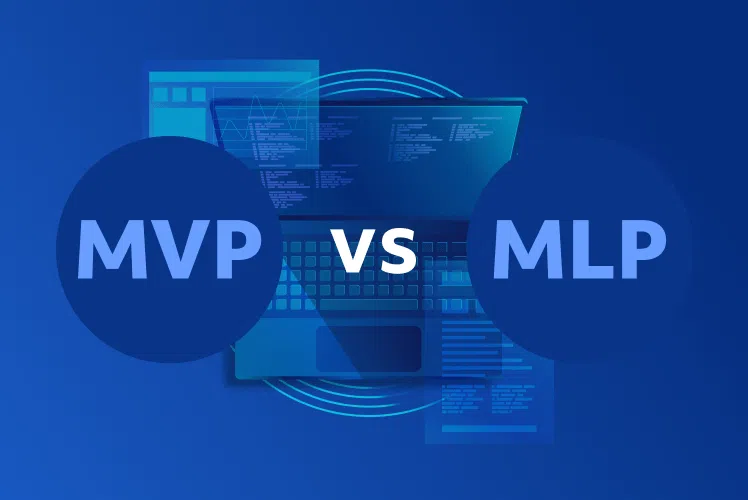Java and C# have become the gold standard for modern software design. But as technology advances, the line between both blurs. But what is going on? C# was initially perfectly suitable for large enterprise solutions. As of now, C# has become more versatile with updated features, making it easier to create small projects. Also, being suitable for enterprise development, Java continues adding new features to expand its capabilities and thus becomes a solid alternative for C#.
The choice between them can be hard, considering their similar use cases, syntax, and OOP support. To help you decide between both, we will compare C# vs. Java and explain the main differences and similarities in detail.

A brief overview of C#
C# is a general-purpose, object-oriented programming language. It was developed by Anders Hejlsberg and his team in 1999. Originally, it was known as Cool, also known as “C-like Object-Oriented Language.” Since C# is based on the C family of languages, it combines their most effective functions. Microsoft’s first release of C# was in 2000 as part of the .NET framework.
Due to its close integration with the Microsoft environment, C# provides developers with a wide range of functionality, and its intensive support allows rapid growth. In 2015, with the introduction of .NET Core (now .NET 7), the platform became cross-platform and can run on a wide variety of platforms, regardless of operating system. This capability has significantly expanded the reach of C#.
The language’s strong typing, object-oriented syntax, component-based architecture, rich libraries, and powerful tools make it so in demand across developers. Now, C# is widely used for building web (ASP.NET), desktop, mobile (MAUI, Xamarin), and game apps (via Unity). It continues to evolve, with regular updates and enhancements from Microsoft.
The C# ecosystem
As we already said, C# integrated with the .NET platform is a comprehensive open-source platform for building, deploying, and running apps. It provides a variety of tools, libraries, and languages, including the following main parts:
- Common Language Runtime (CLR) is a runtime environment that provides code compiles and execution in a variety of languages (C#, Visual Basic, F# and others);
- .NET Class Library is a vast collection of classes, methods, and APIs that provide access to operating system functionality and other system resources.
Benefits and drawbacks of C#
Here is a list of the main benefits of C#:
- Language features: C# provides developers with many modern and expressive features, like properties, delegates, LINQ (Language Integrated Query), and async/await for asynchronous programming, making developers more effective and code easier to read;
- Modern improvements: .NET & C# have evolved significantly in recent years. The new versions have brought improvements in performance, cross-platform support, and framework upgrades. Java has also made progress, but .NET’s transformation has been more pronounced;
- Interoperability: as C# is based on the C language family, you can easily integrate it with other languages like C, C++, and JS, thus allowing more flexible development;
- Integration with Windows ecosystem: C# and .NET are designed by Microsoft and seamlessly work with the Windows operating system and Microsoft products. C# and .NET provide a natural advantage with Windows-specific features or APIs;
- Rich development environment: Visual Studio and Rider are highly regarded IDE for their productivity and debugging capabilities;
- Clear documentation: C# provides a wealth of resources, tutorials, video series, and guidance to assist developers to efficiently write robust code and get the most out of the language.
While C# has many benefits, it also has certain drawbacks to keep in mind:
- Hard learning curve: due to its broad feature set, tools and frameworks, C# provides a challenging learning curve compared to other languages;
- Vendor lock-In: .NET is closely tied to Microsoft, and using C# and .NET may lead to vendor lock-in. Java is more open and has multiple implementations and vendors, reducing the risk of lock-in;
- Licensing costs: some advanced features of .NET and some development tools (e.g., Visual Studio) can be costly, whereas Java has a strong open-source ecosystem with free development tools and libraries.
A brief overview of Java
Java is an extensible, high-level, object-oriented programming language that was officially released by Sun Microsystems (currently Oracle) in 1995. It was created by James Gosling, Mike Sheridan, and Patrick Naughton. At first, it was decided to use C++ to build the needed project. However, C++ is a platform-dependent language and thus cannot be used on different electronic device processors. As a solution, Gosling created Oak (the first name), a platform-independent language. It meant that code could run on various platforms without modification ( that C# couldn’t do).
The code is first compiled into an intermediate stage called the Java Byte Code. Then, the JBC is translated into the native machine code by using the Java Virtual Machine (JVM) based on the operating environment. As a result, developers can write code once and run it anywhere. The concept is known as (WORA).
In the beginning, Java was used to connect systems on networks and interactive television. Now, it is an excellent option for building complex mobile and web solutions, Artificial Intelligence, Big Data, blockchain, and Internet of Things solutions. Due to its platform independence, robustness, security features, and a broad set of tools, Java has become one of the most widespread languages around the globe.
The main components of Java
- Java Virtual Machine (JVM): provides a runtime environment to execute Java code. It compiles and interprets Java Byte Code into native machine code, which then runs on the specific operating system. During this process, JVM manages memory, security, and exception handling. Hence, Java apps run quickly and effectively.
- Java Development Kit (JDK): an essential tool set to build Java apps. It includes the Java compiler, Java Runtime Environment (JRE), Javadoc, and various tools and libraries for development. To create, compile, and run Java apps, you must install the JDK. Users can install multiple JDK versions for effortless execution of programs on various operating systems.
JDK = JRE + Developer tools.
- Java Runtime Environment (JRE): is a runtime environment to execute Java apps. As a subset of JDK, it contains class libraries, loader classes, and JVM. It does not include development tools such as Java debugger, compiler, etc. JRE is platform-dependent. In other words, you need to install a JRE compatible with your OS and architecture.
JRE = JVM + library classes.
The combination of JDK, JVM, and JRE is the backbone of Java’s cross-platform compatibility and its widespread use in various apps. Now, let’s look at the language’s strengths and weaknesses.
Java Debugging Best Practices
Benefits and drawbacks of Java
Java comes with a number of benefits:
- Platform independence: byte code can run on any platform with a compatible Java Virtual Machine (JVM), thus making the language highly portable and flexible;
- Object-oriented: it supports object-oriented programming (OOP), which uses structures and a modular approach to write code. It facilitates code reuse and enhances maintainability.
- Superior security: built-in security features like byte code verification and security manager enhance security against threats and risks;
- Garbage collection support: automatic memory management by the JVM removes unused objects and reduces memory-related issues;
- Multi-threading: it supports multithreaded environments, where tasks can be separated into threads and run independently. It increases app efficiency and performance;
- Distributed: the language lets you share the data between different devices, collaborating remotely to improve performance;
- A rich array of APIs: developers have a wide range of APIs to streamline the development process by using reusable parts of code;
- Large community: Java’s community brings continuous improvements, updates, and a lot of third-party resources and tools, increasing its versatility and capabilities.
Among Java’s drawbacks are:
- Poor GUI: it has many frameworks for creating GUI, but they are not developed enough to build complex GUIs;
- Performance issues: it uses more memory and is slower than other languages because it interprets code into machine language. Using JVMs and automatic garbage collection negatively impacts performance;
- Commercial license needed: it remains free for general use, but you need to purchase an Oracle license to access all its features;
- Code complexity: while Java is not difficult to learn, it often requires more lines of code than other languages. As a result, it may not be easy to maintain codebases, especially for complex apps.
- No backup facility: it focuses more on storage than backup. Due to the lack of built-in backup facilities, developers must implement their own backup procedures, which can be time-consuming and error-prone.
Now that you understand the main benefits and drawbacks of both, let’s compare them to see which is best for your project.
The differences between C# and Java
Both languages have many things in common. The differences between C# and Java are not very significant, but it’s still important to know about them.
Performance
Both languages, C# and Java, offer unparalleled performance. A slight difference exists. Java code is compiled into byte code, interpreted by the Java Virtual Machine (JVM), and then runs on JRE (Java Runtime Environment). So, the language has too many compilation layers, which slows down the execution time.
C# has an edge over Java due to its compiled nature. C# code is compiled into the intermediate language directly into native code and runs on CLR (Common Language Runtime). As a result, native code runs faster and more efficiently. Also, processors have shorter response time and less load.
Java vs. C# performance is not significant. Performance often depends on various other factors: developers’ skills, project requirements, and platform choice.
The winner: C#
Popularity
According to the TIOBI statistics 2021, Java ranked #2, and C# ranked #5 in popularity. In 2022, Java moved down to the #3 position, and C# remains at the #5 position. As for now, both languages go closely hand-by-hand.
According to the TIOBI Index:
- Java ranks #3
- C# ranks #4
According to the StackOverflow Developer Survey:
- Java ranks #7 with 30.55%
- C# ranks #8 with 27,62%
So far, Java is ahead of C#. But who knows what will happen next? Popularity can vary over time. It depends on specific use cases, project requirements, and many other factors when choosing between both.
The winner: Java
The main similarities between C# and Java
Security
Both languages can boast impressive security features. The security level depends on how you design, implement, and configure your app and its infrastructure.
Java was originally designed to focus on security. Due to its statically typed nature, it significantly reduces errors caused by type, while automatic code verification ensures correctness before execution. The language has a security manager enforces various security policies. When it comes to integration with third-party libraries and apps, it is not reliable. The most notable security concern was the discovery of security flaws in the (JRE), which led to several high-profile security breaches.
C# is statically typed, too. It uses .NET security that provides robust security capabilities: authentication, authorization, and vulnerability protection. Like Java, C# has faced security vulnerabilities in the past. Security improvements and updates from Microsoft address these issues regularly.
Pay attention: regardless of the language you choose, you should always follow best practices in coding, use secure libraries and frameworks, regularly update your software, and conduct security audits.
The winner: both
Versatility
Java offers cross-platform compatibility, which makes it a top choice for complex web and mobile solutions. Java’s extensive libraries, mature frameworks, and strong community support make it suitable for:
- Enterprise apps
- Desktop apps
- Web development
- Mobile development
- Cloud-based apps
- Server-side apps
- AI and ML, IoT development
If you’re looking for a language with solid support for OOP and modern features, C# is an excellent choice. It shines brightly in the Microsoft ecosystem, where it effortlessly integrates with technologies like .NET and Azure. You can use it to create:
- Enterprise apps
- Desktop apps
- Web apps
- Mobile apps
- Cloud-based apps
- Game apps with Unity
Although they are almost the same, Java has a strong position in mobile development and C# in game development.
The winner: both
Syntax
When it comes to C# vs. Java syntax, C# is similar to the C family and focuses on improved OOP support. It means C# is a collection of objects that communicate through method calls to work together. Also, the language supports automatic garbage collection and is strongly typed, which means variable declarations must be made with data types before usage.
Java is a strictly object-oriented programming language. It is designed to be simple, portable, and secure. Compared to C#, it is a more detailed language that relies on code blocks and explicit declarations of data types. It uses a garbage collection feature to manage memory.
The other difference is that C# developers can use properties, whereas Java needs “get/set” methods instead of properties. Java has built-in annotation processing that C# lacks. As a result, you can choose what is better for you.
The winner: both
Web Development
Both languages are widely used in web development. Java was and continues to be the perfect choice for building web apps, web services, and dynamic web content. Scalability, portability, and security make it a top choice for engineers. Frameworks like Spring and Java EE give developers strong tools for creating enterprise-level web apps.
C# uses ASP.NET as a framework for building websites and web apps. This framework offers robust security features, support complex functionality, Visual Studio development, and seamless integration with JS and Windows systems. C# also includes modern frameworks like .NET Core for cross-platform development. These advantages make C# an excellent choice for building backend services and large-scale web apps.
They both support cloud platforms like AWS, Google Cloud, and Azure.
The winner: both
Scalability
Java is often preferred in environments with platform independence since adding more servers makes it easy to scale apps horizontally. Its scalability makes it ideal for large-scale applications.
C# is associated with the Microsoft ecosystem running on Windows. With .NET Core, C# is used platform-independently and provides horizontal scaling for high scalability. For example, Microsoft Azure hosts web apps, offering excellent scalability options. Furthermore, ASP.NET, a web framework for C#, offers scalability features: load balancing and caching.
The winner: both
A brief comparison of C# vs. Java
To put all the information together, we have combined the main aspects of C sharp vs. Java in the table below:
| C# | Java | |
|---|---|---|
| Creation | By Microsoft in 2000 | By James Gosling in 1991 |
| Language | Language independent | Language independent |
| Performance | Faster than Java | Lower than C# |
| Cross-platform | Yes (with .NET Core) | Yes |
| Architecture | Code is compiled into intermediate language and then directly (IL) into native code and runs on CLR (Common Language Runtime) | Code is compiled into byte code, which is interpreted by the Java Virtual Machine (JVM) and runs on the JRE (Java Runtime Environment) |
| Scalability | High scalable | High scalable |
| Security | High level | High level |
| Mobile support | Yes, but it is less popular | Yes |
| Syntax | it is a strongly typed and component-oriented language that supports OOP | it is a class-based object-oriented programming language that supports OOP and its features |
| Structure | Supports micro-services and large apps | Easy to create and maintain large apps |
| Key benefits | Modern features keep up with the times Rich IDEs | Platform independence Rich libraries and ecosystem |
| Key drawbacks | Licensing costs | Slower startup time than native languages |
| Use cases | Web, mobile, desktop, and specifically game apps | Complex web-based apps and mobile |
| Popularity | Based on TIOBI it ranks #4 StackOverflow it ranks #8 | Based on TIOBI, it ranks #3 StackOverflow it ranks #7 |
| Popular brands | Microsoft, Stack Overflow, Intuit | Airbnb, Instagram, Spotify, Netflix |
Final thoughts
The C# vs. Java debate is less about picking a winner and more about choosing the most appropriate tool for a particular project. C#, compared to Java, is more dynamic and modern. Java has a long-standing reputation for its portability and robustness. Keeping up with emerging technologies and developers’ needs, both languages will continue to grow. They will remain prominent “players” in software development, each focusing on a specific field.
The choice between them will depend on your project requirements, your familiarity with the languages, and the ecosystem in which you operate. No matter what language you choose, our experienced developers will provide you with the top-quality software. Contact SoftTeco today and start your project!



Comments